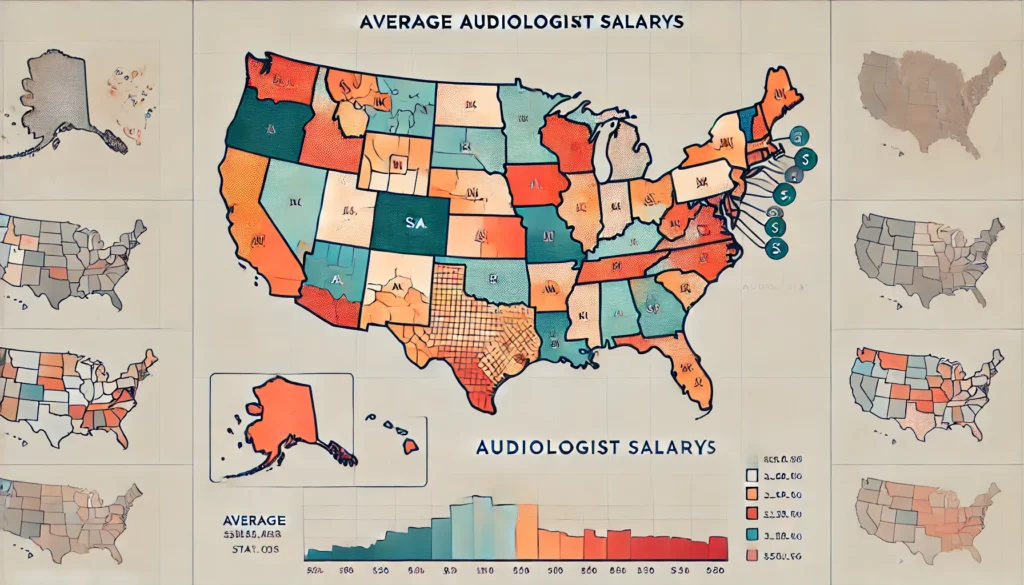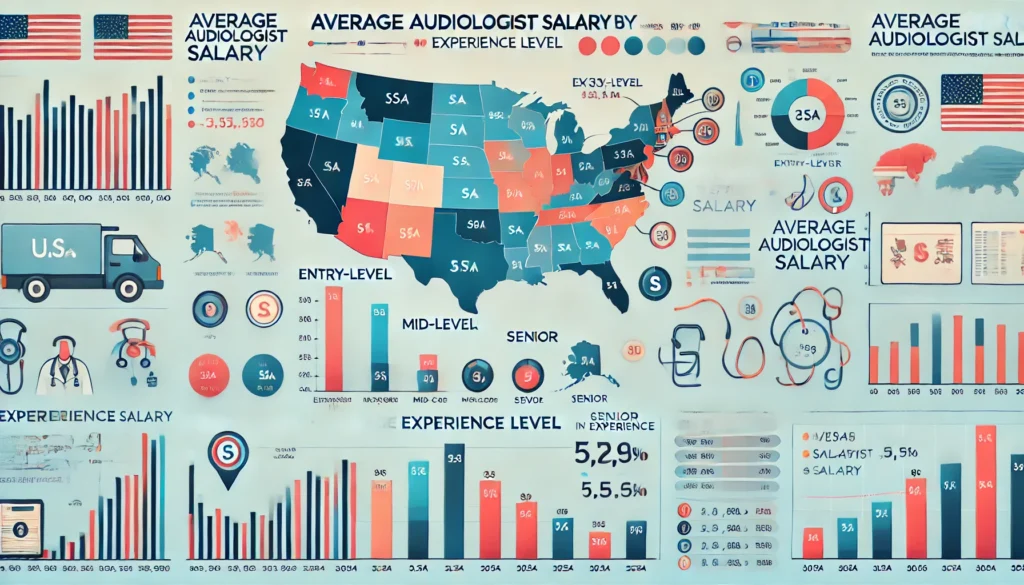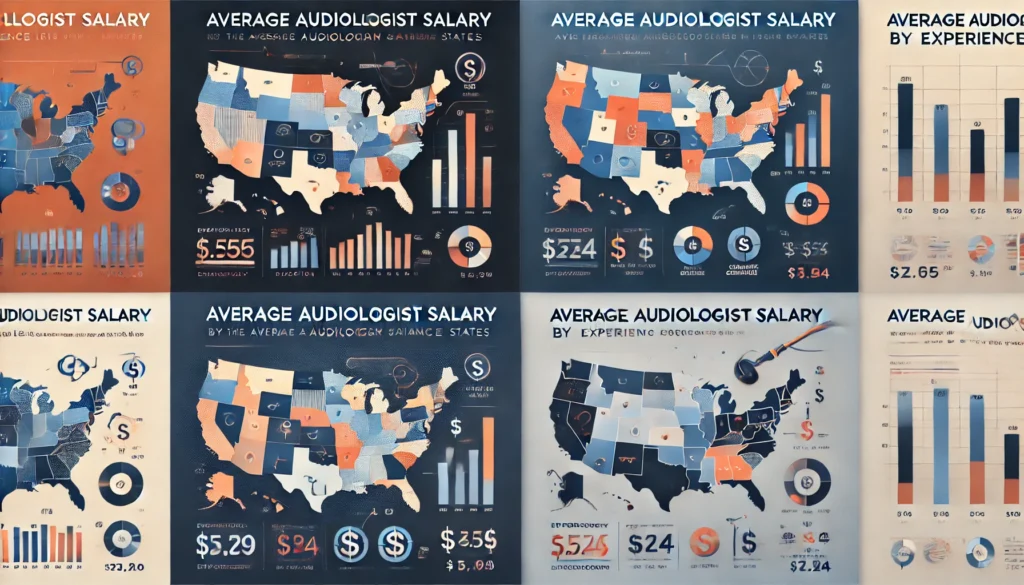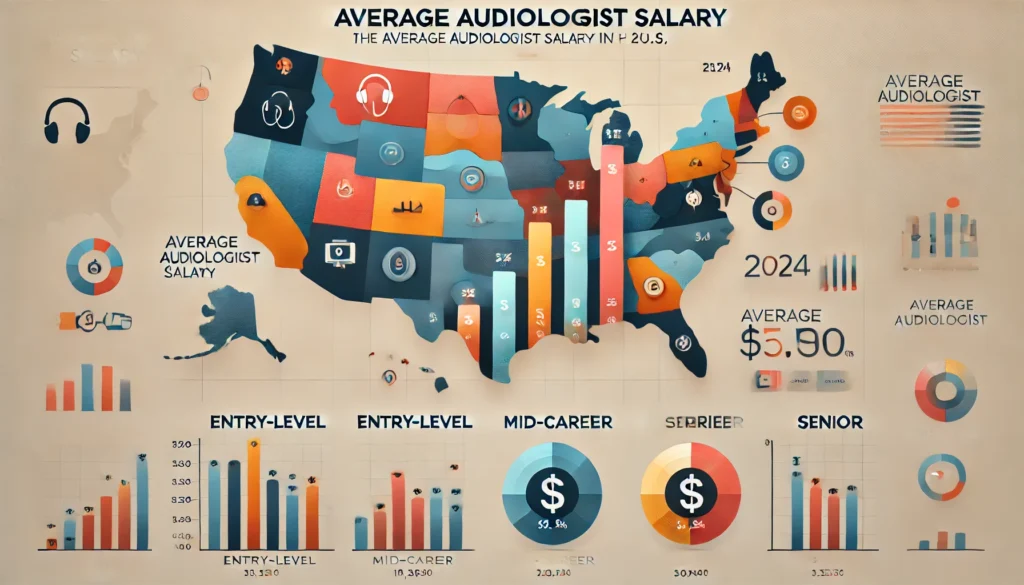Are You Earning the Average Audiologist Salary, or Could You Be Making More? Are You Earning the Average Audiologist Salary, or Could You Be Making More? Audiology is a rewarding field, offering both the opportunity to improve lives and the potential for lucrative salaries. However, just like in any profession, compensation varies based on experience, location, and employer. Whether you are an experienced audiologist or someone considering a career in audiology, understanding salary trends is essential for career planning and financial growth.
This article covers the average audiologist salary in the U.S., the impact of experience and location on pay, and how certifications boost earnings. By the end, you’ll know where you stand and if your salary matches industry benchmarks.

Understanding the Average Audiologist Salary in 2024
What Is the Average Audiologist Salary Across the U.S.?
The average salary for audiologists in the United States is approximately $81,000 per year, according to the U.S. Bureau of Labor Statistics (BLS). However, this figure can fluctuate significantly based on experience, location, and the type of employer. Entry-level audiologists tend to earn less than their experienced counterparts, with salaries gradually increasing as they gain more experience and specialize.
A deeper dive into the numbers reveals that the salary range for audiologists varies between $60,000 and $110,000 annually, with some specialists in high-demand regions earning even more. The wide range reflects the diversity of audiologists’ roles and the differences in regional economic conditions.
Key Factors That Influence Audiologist Salaries
Several key factors determine an audiologist’s earning potential. These factors include:
- Experience Level: As with most professions, experience significantly affects salary levels. Entry-level audiologists may earn less, but as they accumulate experience and take on more responsibility, their salary can increase substantially.
- Location: The cost of living and audiologist demand can significantly affect salary. Audiologists working in large urban centers tend to earn higher salaries, while those in rural areas may see lower compensation, though the cost of living can be much lower.
- Specialization: Audiologists specializing in particular areas, such as pediatrics or cochlear implants, may command higher salaries. Specializing in high-demand areas often increases marketability and earning potential.
- Employer Type: Audiologists working in private practice or specialized medical settings tend to earn more than those working in schools or outpatient clinics.
Comparison of Audiologist Salary by State
Location plays a crucial role in determining how much an audiologist can earn. States with a higher cost of living tend to offer higher salaries to compensate for the increased expenses. For example:
- California is one of the states with the highest audiologist salaries, with salaries between $95,000 and $120,000. This is driven by high demand in urban areas like Los Angeles and San Francisco.
- Texas: Audiologists in Texas earn an average of $85,000 to $110,000 annually. The state’s diverse economy and large healthcare sector contribute to this range.
- New York: With its strong healthcare system, New York offers salaries of $90,000 to $115,000, although the cost of living in cities like New York City significantly reduces purchasing power.
- Florida: Audiologists in Florida earn around $80,000 to $100,000, with variation depending on whether they practice in more urban areas like Miami or rural settings.
These salary figures are influenced by the cost of living, the presence of healthcare institutions, the aging population, and the demand for hearing services.

Audiologist Salary Breakdown by Experience Level
Entry-Level Audiologist Salaries
As a new graduate, you can expect to start your career with a salary on the lower end of the scale. The average salary for an entry-level audiologist is around $60,000 to $70,000 per year, depending on the state, employer, and specialization. However, this is just the starting point. Entry-level audiologists can expect significant salary increases within the first few years of their career, especially if they work in high-demand regions or pursue additional certifications.
Mid-Career Audiologist Salary Expectations
Audiologists can expect their salaries to increase substantially after 5-10 years in the field. More experience comes more responsibility, which may include supervising junior staff, managing a private practice, or taking on more specialized roles. Mid-career audiologists earn an average salary between $80,000 and $100,000, depending on their experience, region, and area of specialization. Those who remain committed to developing their skills and taking on higher-level roles often see salary increases at this stage.
Senior Audiologist and Specialist Pay Scales
Experienced audiologists who have specialized in a certain area or taken on senior roles can command some of the highest salaries in the field. Audiologists with 10+ years of experience or those in high-demand specialties such as pediatric audiology or cochlear implant fitting can earn salaries ranging from $100,000 to $130,000 annually. High demand, additional certifications, and leadership roles within healthcare organizations often drive this salary range (Visit our comprehensive guide to healthcare leadership salaries to learn more about salary expectations and career growth opportunities in healthcare leadership).
How Location Affects Audiologist Pay
Regional Differences in Audiologist Salaries
As mentioned earlier, your practice or employment location can significantly impact your salary. Audiologists in large metropolitan areas generally earn more due to the higher cost of living and increased demand for services. On the other hand, rural areas may offer lower salaries but benefit from a lower cost of living and potentially less competition.
Audiologists working in states with a higher cost of living, such as California, New York, or Massachusetts, tend to earn higher salaries to compensate for the increased expenses. In contrast, audiologists in states like Wyoming or Arkansas may earn less but also benefit from lower living costs, making the disparity less significant.
States with the Highest Audiologist Salaries
Several states stand out for offering higher-than-average salaries for audiologists. These include:
- California: As one of the states with the highest audiologist salaries, California offers competitive salaries across urban and rural areas.
- Massachusetts: Audiologists in Massachusetts benefit from high salaries, often in the range of $90,000 to $110,000, driven by the state’s healthcare infrastructure.
- New Jersey: With salaries around $85,000 to $110,000, New Jersey offers competitive compensation for audiologists, especially in metropolitan areas like Newark and Jersey City.
- Washington: Known for its thriving healthcare sector, Washington state provides strong salaries, with audiologists earning between $80,000 and $100,000.
These states offer high salaries and have many healthcare facilities and a growing audiologist demand.
Cost of Living and Salary Adjustments
It is essential to consider the cost of living when evaluating salary offers. A high salary in an expensive state may not go as far as a lower salary in a more affordable region. For instance, while audiologists in New York may earn significantly more than those in Wyoming, the cost of living in New York City can be more than twice that of rural Wyoming, making the effective salary difference smaller than it seems.

Audiologist Salary by Employment Type
Salaries for Audiologists Working in Healthcare vs. Private Practice
The type of employer plays a critical role in determining salary levels. Audiologists in healthcare settings such as hospitals, outpatient clinics, and medical centers earn between $75,000 and $90,000 annually. In contrast, those who work in private practice or as independent consultants may earn more, as they can manage their pricing and attract higher-paying clients. Depending on location and clientele, private practice audiologists earn $90,000 to $120,000 annually.
Audiologists in Educational vs. Clinical Settings
Audiologists who work in schools or universities often earn lower salaries than those in clinical settings. In educational settings, salaries typically range from $60,000 to $80,000, whereas clinical audiologists in hospitals and private clinics can earn between $75,000 and $100,000. However, working in educational settings can offer more job stability and benefits, which may appeal to some audiologists.
The Impact of Certifications on Audiologist Salaries
Additional Certifications that Can Boost Audiologist Pay
Pursuing additional certifications can significantly increase an audiologist’s earning potential. For example, becoming certified in pediatric audiology, cochlear implants, or tinnitus management can make an audiologist more competitive in the job market. These certifications increase the chances of landing higher-paying roles and allow audiologists to charge higher fees for specialized services.
How Specializations Affect Audiologist Income
Specializing in specific audiology areas often leads to higher salaries. Audiologists who focus on complex areas, such as cochlear implants or neurotology, can command some of the highest salaries in the field. Additionally, audiologists who choose to work with high-risk populations, such as the elderly or children with hearing impairments, may also earn more due to the complexity and demand for these services.

Projected Salary Growth for Audiologists
Audiologist Job Market Outlook and Salary Projections
The audiologist job market is expected to grow by about 16% from 2021 to 2031, much faster than the average for all occupations. This growth is driven by the aging population and the increasing need for hearing care services. As a result, audiologists’ salaries are expected to continue rising in response to higher demand for their services.
Factors Driving Salary Growth for Audiologists
Several factors contribute to the projected salary growth for audiologists, including:
Career Advancement Tips for Audiologists
- Pursue advanced degrees for better roles.
- Obtain specialized certifications to increase marketability.
- Join professional networking events to find opportunities (Discover tips on building a strong healthcare network that supports your professional advancement).
Comparison with Related Professions
- Compare audiologist earnings with speech-language pathologists and occupational therapists.
- Highlight earning potential differences in healthcare fields.
Freelancing and Entrepreneurship in Audiology
- Start a private practice for higher income.
- Offer teleaudiology services for flexible revenue (For more detailed insights, you can explore the full article here: Boost Telemedicine Salary by 30% Fast).
- Consult for medical device companies.
Work-Life Balance in High-Paying Roles
- High salaries may mean longer hours or high-pressure roles.
- Learn strategies to balance earnings with sustainable growth.
Regional Cost of Living Calculator
- Use tools to compare salaries across states.
- Factor in living costs to assess real income value.
Negotiation Strategies for Audiologists
- Tips to negotiate better salaries and benefits (Discover comprehensive salary negotiation strategies tailored to healthcare professionals).
- Highlight certifications and skills during discussions.
Learning to negotiate effectively is essential, and resources like the Harvard Business Review provide expert tips on salary negotiation.
Impact of Technology on Salaries
- AI-based hearing aids and teleaudiology shape audiology roles (For more detailed insights, you can explore the full article here: Boost Telemedicine Salary by 30% Fast).
- Embrace tech advancements for higher earning opportunities.
Diversity and Inclusion in Salaries
- Analyze salary disparities by gender and race.
- Suggest actionable steps to address inclusivity.
Global Comparison of Audiologist Salaries
- Compare U.S. audiologist salaries with global earnings (This guide on global healthcare salaries offers valuable insights into salary trends and opportunities worldwide for those looking to maximize their earnings in the healthcare sector.).
- Offer international perspectives on the profession.
Emerging Trends in Audiology Careers
- Explore growth in telehealth services (For more detailed insights, you can explore the full article here: Boost Telemedicine Salary by 30% Fast).
- Highlight opportunities in auditory processing disorders.
Optimizing these strategies can help audiologists maximize their earning potential while staying aligned with industry trends and regional variations in the Average Audiologist Salary.
Audiologist Salary Overview by Key Factors
| Factor | Salary Range | Insights |
|---|---|---|
| Experience Level | $60,000 – $130,000 | Entry-level salaries start at around $60,000, mid-career professionals earn $80,000 – $100,000, and senior audiologists with specializations can exceed $130,000. |
| Location | $60,000 – $120,000+ | States like California and New York offer higher salaries ($90,000+), but cost of living is a significant factor. Rural areas may pay less but offer lower expenses. |
| Specialization | $80,000 – $130,000 | Specializations in pediatrics, cochlear implants, or neurotology command higher salaries due to demand and complexity. |
| Employer Type | $60,000 – $120,000 | Private practice audiologists tend to earn more than those in schools or outpatient clinics, but stability and benefits can vary. |
| Certifications | +10% to 20% Salary Boost | Additional certifications, like in tinnitus management or pediatric audiology, often lead to higher earning potential. |
FAQ: Frequently Asked Questions About Audiologist Salaries
1. What is the national average salary for an audiologist?
The national average salary for audiologists in the U.S. is approximately $81,000 per year, according to the U.S. Bureau of Labor Statistics. However, this can vary widely based on location, experience, and employer type.
2. How does location affect an audiologist’s salary?
Salaries are generally higher in urban areas and states with a high cost of living, such as California and New York. Rural areas may offer lower salaries, often balanced by a lower cost of living.
3. Do certifications impact audiologist salaries?
Yes, obtaining additional certifications, such as those in pediatric audiology or tinnitus management, can significantly boost salary potential by increasing specialization and marketability.
4. What type of employers offer the highest salaries?
Private practices and specialized medical settings typically pay higher salaries than schools or outpatient clinics. Private practice audiologists may also have the potential to earn more through client fees.
5. How can I negotiate a higher salary as an audiologist?
Research industry standards, highlight your experience and certifications, and be prepared to articulate how your skills align with the employer’s needs. Negotiation training or workshops can also help.
6. What is the job market outlook for audiologists?
Audiology is expected to grow by 16% from 2021 to 2031, driven by an aging population and increased demand for hearing care services. This growth is likely to lead to steady salary increases.
7. Are there opportunities for audiologists to work remotely?
Yes, teleaudiology is a growing field that allows audiologists to work remotely. This can open up additional revenue streams and flexibility in work arrangements. For more detailed insights, you can explore the full article here: Boost Telemedicine Salary by 30% Fast.
Conclusion: Making Informed Decisions About Your Audiologist Career
Understanding the factors influencing audiologist salaries can empower you to take control of your career growth. From gaining additional certifications to considering cost of living adjustments, maximizing your earning potential involves strategic planning and informed decision-making.







